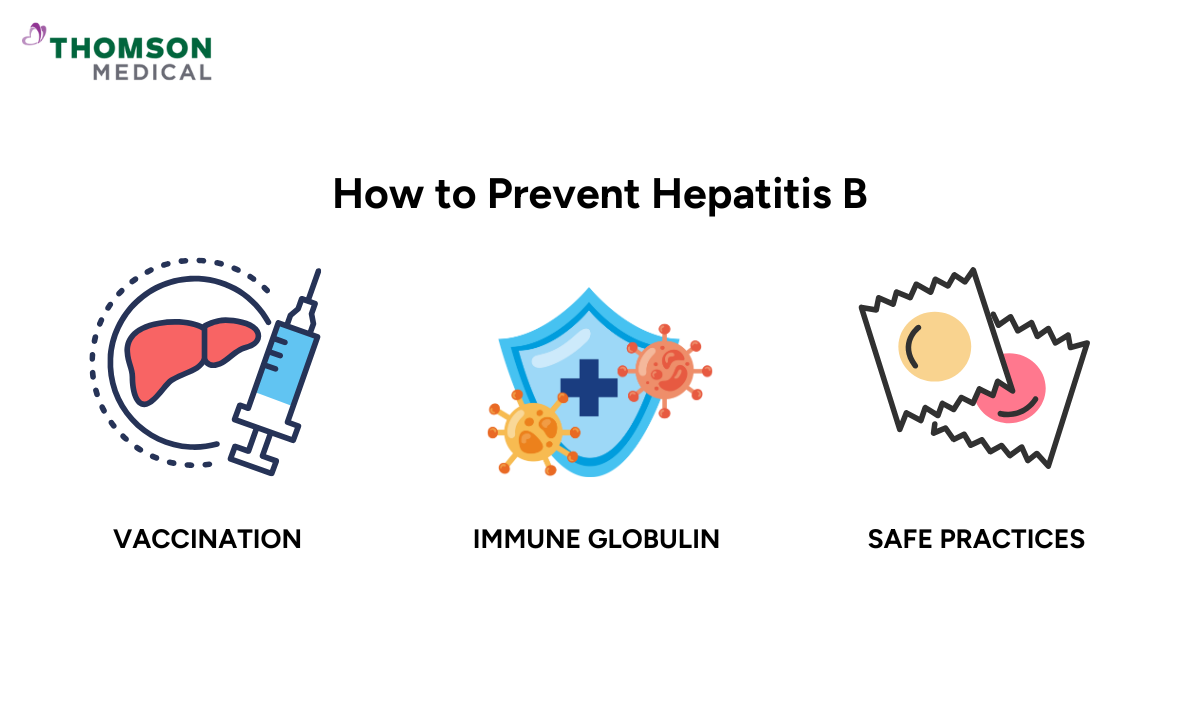Hepatitis B is a silent virus that can damage your liver for years without causing any noticeable symptoms. In many cases, people only discover that they're infected when serious complications appear.
Understanding how it spreads, what to watch for, and how to protect yourself could save your life and protect the health of those around you.
What is hepatitis B?
Hepatitis B is a viral infection caused by the hepatitis B virus (HBV) that targets the liver. It can cause acute (short-term) or chronic (long-term) illness.
Some people recover completely, while others may carry the virus for life. This infection can cause serious problems like liver cirrhosis, liver failure, or liver cancer (hepatocellular carcinoma).
HBV spreads primarily through contact with blood, semen, or other bodily fluids, most often via:
Unprotected sexual contact
Sharing needles or other drug equipment
From mother to child during childbirth
Understanding how hepatitis B spreads is the first step in protecting yourself and your loved ones.
What are hepatitis B symptoms?
One of the challenges of hepatitis B is that many people don’t show symptoms initially, making early detection difficult. When symptoms do appear, they may include:
Fatigue and weakness
Fever
Loss of appetite
Nausea and vomiting
Abdominal pain, especially in the upper right side
Dark urine
Clay-colored stool
Yellowing of skin and eyes (jaundice)
Joint or muscle pain
Symptoms usually develop 1 to 4 months after infection, but in some cases, they may be mild or entirely absent.
If you observe any of these warning signs, book an appointment with Thomson Medical today to protect your health and others around you.
How do I know if I am a hepatitis B carrier?

If the virus remains in the blood for over six months, a person is considered a hepatitis B carrier. Even without showing any visible symptoms, you can still transmit the virus.
In this case, blood tests are required to verify carrier status, including:
HBsAg (Hepatitis B surface antigen)
This test indicates that there is an ongoing hepatitis B infection in the body.
HBV DNA
This measures the amount of virus, also known as the viral load, present in the blood.
Who is at risk of hepatitis B?
Certain groups are at higher risk, including:
Newborns born to infected mothers
People who are sexually active
People who use drugs and share needles
Healthcare workers who come into contact with blood or other body fluids
Individuals on dialysis
Residents in places with high HBV concentration (Asia, Africa, the Pacific Islands)
Family members of infected individuals
As the symptoms can go unnoticed, regular health checks are highly recommended to ensure your well-being. If you’re in any of these groups, make sure to book regular check-ups to stay updated on your health.
How is hepatitis B diagnosed?

Many people with hepatitis B never experience symptoms, so the infection can go unnoticed for years. Getting a hepatitis B screening is the only way to confirm if you’re infected.
To determine if someone has hepatitis B, doctors typically go through a series of checks, including a physical exam alongside lab tests.
Clinical evaluation
When diagnosing hepatitis B, your doctor starts with a detailed assessment. They examine your medical history and any symptoms, such as:
History of risk factors
Blood exposure
Sexual contact
Perinatal
IV drug use
Symptoms:
Fatigue
Loss of appetite
Jaundice
Pain in the right upper abdomen
Nausea
However, it is important to note that chronic cases might not show any clear symptoms.
Key laboratory tests for hepatitis B diagnosis
Doctors can confirm hepatitis B and learn more about your liver’s health by performing a combination of lab tests. These tests help determine the stage of infection and whether the virus is affecting your liver’s function.
Key assessments include liver function tests and serological markers. Together, these results provide doctors with a clearer picture of your overall liver health and guide decisions about treatment, monitoring, and long-term care.
Liver function tests
Liver function tests play a key role in monitoring hepatitis B and evaluating overall liver health. These blood tests measure important enzymes such as ALT (alanine aminotransferase) and AST (aspartate aminotransferase) to detect signs of liver inflammation or damage.
Elevated ALT or AST levels usually indicate active liver inflammation or injury caused by the HBV.
In chronic hepatitis B, these enzyme levels may fluctuate or stay persistently high, suggesting ongoing liver stress or damage.
Regular liver function testing helps doctors track disease activity, assess treatment response, and prevent long-term complications like cirrhosis or liver cancer.
Serological markers
Serological markers are special blood tests that help doctors understand more about your hepatitis B infection. They show whether the virus is active, how contagious it is, and what stage the infection is in.
These tests look for different antigens and antibodies in your blood, which act like clues about how your body is responding to the virus. The results then help doctors decide what kind of care or follow-up you might need and how to protect others from infection.
Here are some of the most common markers doctors check for:
Marker | Interpretation |
HBsAg | Indicates current infection (acute or chronic) |
Anti-HBs | Indicates immunity (recovery or vaccination) |
Anti-HBc (IgM) | Acute/recent infection |
Anti-HBc (IgG) | Past or chronic infection |
HBeAg | Marker of active viral replication and high infectivity |
Anti-HBe (HBeAb) | Marker of lower infectivity and reduced replication |
Molecular tests
The HBV DNA PCR testmeasures the amount of virus in your blood. This helps doctors see if the infection is active, track its progression, and know if treatment is working.
Imaging and biopsy
In some cases, an ultrasound, FibroScan, or liver biopsy may be used to check for liver damage like fibrosis or cirrhosis.
Our sexual health specialists
Loading...
What are hepatitis B treatments?
How hepatitis B is treated depends on whether it’s an acute or chronic infection.
Acute Hepatitis B:
Most adults recover naturally, so treatment is usually not necessary. Staying hydrated, eating healthy foods, and getting enough rest are important for helping the body fight the infection.
Chronic Hepatitis B: This condition requires ongoing monitoring and antiviral therapy to manage the virus. Common medications include:
Tenofovir:
Stops the virus from multiplying and protects the liver
Entecavir:
Works similarly to tenofovir, helping lower viral levels
Pegylated interferon (in some cases):
Boosts the immune system to fight the virus, used in select cases
The goal of treatment is to reduce the viral load, prevent liver damage, and lower the risk of complications.
How to prevent hepatitis B

Hepatitis B can be serious, but the good news is that it’s also very preventable. With a few mindful habits, you can greatly reduce your risk and protect your health. By making prevention a part of your regular health routine, you’re both protecting yourself and helping stop the spread of hepatitis B.
Hepatitis B vaccination:
The hepatitis B vaccine is safe and highly effective, and it is part of most childhood immunisation programmes.
Hepatitis B immune globulin (HBIG):
Provides strong protection within 24 hours of exposure to HBV, especially for newborns or those with needle-stick injuries
Safe practices:
Use condoms, avoid sharing needles or personal items like razors, and ensure all blood products are properly tested.
FAQ
Can hepatitis B be cured completely?
There is no complete cure for chronic hepatitis Bat this moment. However, antiviral treatments can control the infection and reduce risks, while acute hepatitis B often clears naturally in adults.
How serious is hepatitis B?
Hepatitis B can be very serious. Chronic infection may lead to liver cirrhosis, liver failure, or liver cancer, making it a global health concern.
How long can a person with hepatitis B live?
With proper treatment and monitoring, many people with chronic hepatitis B can live a normal lifespan. Untreated infection increases the risk of severe liver disease.
What are four ways to prevent hepatitis B?
Preventing hepatitis B is much easier than treating it. Simple precautions can greatly lower your risk of infection and protect your liver health.
Get vaccinated against hepatitis B.
Practise safe sex by using condoms.
Avoid sharing needles or personal items, such as razors and toothbrushes.
Ensure that blood transfusions and medical procedures are safe.
What is the main cause of hepatitis B?
Hepatitis B can develop if someone contracts the HBV. People often get it through:
Shared needles
Sexual contact
From mother to child
How long can you have hepatitis B without knowing?
Many people can live with hepatitis B foryears or even decades without realising they’re infected, as the virus often causes no clear symptoms in its early stages. During this time, it can silently damage the liver, increasing the risk of serious complications such as cirrhosis, liver failure, or liver cancer.
Because of this, routine screening for hepatitis B is strongly recommended, especially for people in high-risk groups, such as:
Those with a family history of the disease
Healthcare workers
Individuals with multiple sexual partners
Anyone who has lived in regions where hepatitis B is common.
The information provided is intended for general guidance only and should not be considered medical advice. For personalised recommendations and tailored advice based on your unique situations, please consult a specialist at Thomson Medical. Request an appointment with Thomson Medical today.
For more information, contact us:
Thomson Specialists (Women's Health)
Thomson Women's Clinic (TWC)
- Novena:
6592 6686 (Call), 8611 8986 (WA) - Bukit Batok:
6569 0668 (Call), 8686 3525 (WA) - Choa Chu Kang:
6893 1227 (Call), 8282 1796 (WA) Jurong:
6262 8588 (Call), 6262 8588 (WA)- Katong (female doctor):
6970 2272 (Call), 8611 9020 (WA) - Punggol:
6243 6843 (Call), 8811 0328 (WA) - Sembawang: 6753 5228
- Sengkang: 6388 8125
- Serangoon (female doctor): 6382 3313
- Tampines: 6857 6266
- Tiong Bahru: 6276 1525
